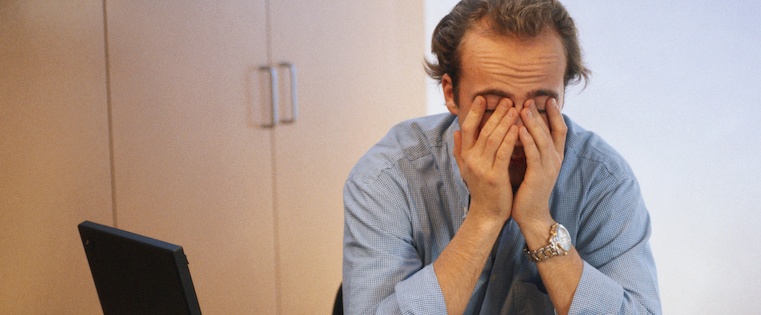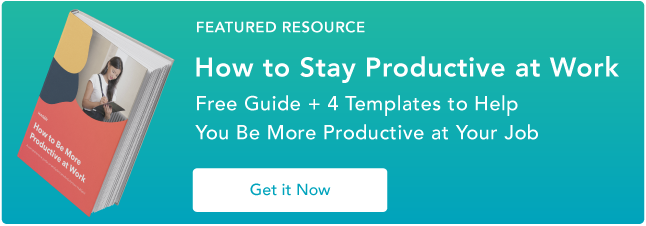
There's no doubt that technology has simplified the way we carry out our day-to-day routines. Computers help us do things faster, emails and text messages let us always be in touch, and the internet makes it easy to find the answer to any question with just a quick Google search.
While being constantly plugged in can make us feel safe, connected, and in-the-know -- both at work and at home -- it also means we never really clock out.
It's one thing to pull a long day every once in a while to finish a project or deal with a crisis, but it's another to routinely stay late at the office or work into the night. That's chronic overwork -- and it can have extremely negative impacts on your health, happiness, and overall quality of life.
But working overtime has become the norm for most people. It's one of those things everyone kinda knows is bad for us, but no one really listens. Trouble is, failure to prioritize a healthy balance isn't just bad for the employees -- it's actually bad for employers, too. Read on to learn exactly why it's bad for our health and our performance at work, and who's to blame.
Why Overworking is Bad For Your Health
There are numerous research studies out there showing the overwork -- and the resulting stress -- can lead to all matter of health problems.
It impairs your sleep.
A wide body of research has shown that overwork can negatively impact your sleep -- whether it's the resulting stress, the staring at the computer screen, or just not having enough time to unwind before hitting the hay. This can cause us to build up what's called "sleep debt," which is kind of like being overdrawn at a bank. Chronic sleep debt raises the risk of obesity, heart disease, stroke, and diabetes. In the short-term, lack of sleep can have significant effects on the hippocampus, an area of the brain involved in memory creation and consolidation.
The fact is, most of us get tired more easily than we think we do. Think you're one of those "lucky people" who can get by fine with only five or six hours of sleep? The Wall Street Journal reports that for every 100 people who think they're a member of this "sleepless elite," only five actually are. Only 1–3% of people can actually pull off sleeping five or six hours a night without their performance suffering
It gets in the way of good habits.
Working too much can take a toll on the body and brain in two main ways -- by boosting stress and by getting in the way of exercise, healthy eating, and other good habits.
For example, when you’re overtired, you rely more on caffeine to get you through the day, you tend to make unhealthy food choices and working out becomes a thing of the past. A study in the journal Nature Communications found that when people are overtired, healthy food choices tend to go out the window for two reasons. First, it slows activity in the areas of our brains responsible for ranking different foods based on what we want and need. Secondly, it causes an increase in the brain's amygdala, which is responsible for controlling the salience of food. Over time, poor food choices can lead to weight gain and even obesity.
It's really bad for your heart.
A long-running study of more than 10,000 civil servants in London found that white-collar workers who worked three or more hours longer than a normal, seven-hour day had a 60% higher risk of heart-related problems than white-collar workers who didn't work overtime. Examples of heart-related problems included death due to heart disease, non-fatal heart attacks, and angina, a condition caused by low blood supply to the heart.
A follow-up study of over 22,000 participants found that people who worked long hours were 40% more likely to suffer from coronary heart disease than those who worked standard hours.
What about overworking might be causing heart disease, specifically?
Research suggests that it might have something to do with your personality. In fact, the "Type A vs. Type B" personality test was originally aimed to determine how likely it was that a person would develop coronary heart disease. Considering Type A folks tend to be more competitive, tense, time-oriented, and stressed out -- which is often intensified by overworking -- their personality type is often associated with a higher risk.
It can cause heavy drinking.
In 2015, the Finnish Institute of Occupational Health published the largest ever study of the correlation between working patterns and alcohol consumption. In the study, a group of researchers put together a dataset of over 330,000 workers across 14 different countries.
They found that 48 hours of work per week was the magic number: When people worked more than 48 hours per week, they were more likely to engage in "increased risky alcohol use." Risky alcohol use was defined as more than 14 drinks per week for women and more than 21 drinks per week for men.
They also found that people who worked long hours were 11% more likely to be heavier drinkers than those who worked normal hours, regardless of gender.
It can lead to type 2 diabetes in low-income workers.
In 2015, a group of researchers investigated the role of long working hours as a risk factor for type 2 diabetes. They found that the link between longer working hours and type 2 diabetes is apparent in individuals in the low socioeconomic status groups. This was true regardless of age, sex, obesity, and physical activity, and remained even when they excluded shift workers from the analysis. Another study showed an association between long hours and type 2 diabetes in low-income workers.
Overall, these findings show how strong of a relationship a person's mental state can have on physical health.
Why Overworking is Bad for Business
If better health and happiness isn't enough of an incentive to do something about chronic overwork, it turns out overworking can have a legitimately negative impact on a business' bottom line. Sarah Green Carmichael of Harvard Business Review calls the story of overwork "the story of diminishing returns": keep overworking, and you'll keep making avoidable mistakes and getting lost in the weeds -- all while not actually producing more.
More input doesn't necessarily mean more output.
Do longer work hours equate to more work getting done? From time to time, yes -- but not when "overtime" becomes "all the time."
Research by the Business Roundtable found employees saw short-term gains when they pushed their workweek to 60 or 70 hours for a few weeks at a time if, for example, they needed to meet a critical production deadline. But increasing the number of hours worked in the office from 40 to 60 hours doesn't result in more output: "In fact, the numbers may typically be something closer to 25–30% more work in 50% more time," writes Sara Robinson for Salon.
Why? Robinson explains that most people do their best work between hours two and six of working in a given day. By the end of an eight-hour day, their best work tends to be behind them -- and by hour nine, fatigue begins to set in and productivity levels drop. They won't be able to deliver to their full potential -- especially if they aren't invigorated by something like a rare, critical deadline -- and they'll end the day completely exhausted.
Interestingly, one study out of Boston University's Questrom School of Business found that managers actually couldn't tell the difference between employees who actually worked 80 hours per week and those who just pretended to. What's more, managers tended to punish employees who were transparent about working less -- but there was no evidence that those employees actually accomplished less, nor were there any signs that the overworking employees accomplished more.
You're more likely to make mistakes.
Speaking of exhaustion, researchers have found that overwork -- and the resulting stress and exhaustion -- can make it far more difficult to do everything that a modern office requires, including interpersonal communication, making judgment calls, reading people, or managing one's own emotional reactions.
You lose sight of the bigger picture.
Ever heard of the term "goal reactivation?" According to a 2011 study from the University of Illinois, people can easily lose focus and get lost in the weeds of a task or project if they work on it continuously without stopping.
The breaks we take to recharge, eat meals, or spend time with the people we love help us step back from our work and stay mindful of how our work contributes to our goals. The study cites that these things reliably contribute to overall better performance at work.
Who's to Blame?
Chronically overworking isn't fun. It doesn't feel good to realize you have to work through yet another family dinner or relaxing weekend. So why do people do it? Is it because our bosses told us to? Or because we want to make more money? Or do we have some deep-seated psychological need? In her article for Harvard Business Review, Carmichael asks, "who's to blame?"
Our managers?
In many cultures, bosses want and expect employees to put in long days, make themselves available on email 24/7, and work nights, weekends, and during vacation without protest. In this version, writes Carmichael, we overwork because we're told to. This is especially evident in the three countries in which employees work the longest hours of all advanced countries in the world: America, South Korea, and Japan.
... Or ourselves?
But most of us can't place all the blame on others. More often than not, working long hours is a way for us to prove something to ourselves.
Maybe working late makes us feel ambitious or important. Maybe it's because we think it's the only way to get a promotion, make more money, or avoid falling behind. Maybe we straight up feel guilty when we get up and leave at 5:00 P.M. Several studies have even shown some of us consider work a safe haven -- a place in which we feel confident and in control as compared with stresses outside the office.
And who could blame us? More and more, working beyond normal business hours has become something people brag about. In some cases, it becomes an addiction.
"We live in a competitive society," writes Laura Vanderkam for The Wall Street Journal, "and so by lamenting our overwork and sleep deprivation -- even if that requires workweek inflation and claiming our worst nights are typical -- we show that we are dedicated to our jobs and our families."
Sometimes, working long hours can feel rewarding -- even invigorating. Other times, especially when we make a habit out of it, it can make us feel stressed, mad, lonely, and generally unhealthy. The key is paying attention to how it makes you feel. If it's interfering with your mental, physical, or emotional help, it may be time to reprioritize.
from HubSpot Marketing Blog http://blog.hubspot.com/marketing/overwork-bad-health
Via http://blog.hubspot.com/marketing/overwork-bad-health

No comments:
Post a Comment